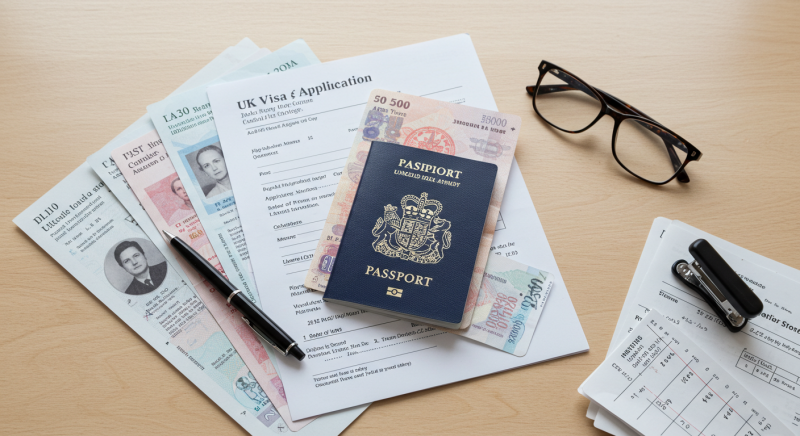Navigating the Maze of UK Travel Visa Requirements in 2025
Planning a trip to the United Kingdom involves understanding the intricate UK travel visa requirements that can sometimes feel overwhelming. Whether you’re dreaming of exploring London’s historic landmarks, experiencing Scotland’s breathtaking highlands, or immersing yourself in the rich cultural tapestry of Britain, securing the proper visa is your gateway to this extraordinary destination.
The UK’s visa system has undergone significant changes since Brexit and continues to evolve in 2025, making it essential for travelers to stay informed about the latest UK travel visa requirements. This comprehensive guide aims to demystify the process, providing you with everything you need to know before embarking on your British adventure.
Key Takeaways:
- Different visa categories exist based on your visit purpose
- Documentation requirements vary significantly by visa type
- Processing times range from 3 weeks to 3 months depending on application type
- Financial requirements must be met to demonstrate sufficient funds
- Digital application processes have streamlined the experience for most applicants
- Advance planning is crucial to ensure smooth visa approval

Understanding the UK Travel Visa Landscape
The United Kingdom offers various visa options tailored to different visit purposes, and understanding which one applies to your situation is the first critical step in navigating UK travel visa requirements. The Home Office reported processing over 3.2 million visa applications in 2024, with approximately 89% receiving approval, according to official government statistics.
For standard visitors—those coming for tourism, visiting family or friends, or engaging in limited business activities—the Standard Visitor Visa typically allows stays of up to 6 months. This category represents the most common entry pathway, accounting for approximately 70% of all UK visas issued annually.
For those planning longer stays or coming for specific purposes like work, study, or family reunification, specialized visa categories exist with their own distinct UK travel visa requirements. The key is identifying which category aligns with your visit intentions before beginning the application process.
Standard Visitor Visa: The Most Common Entry Pathway
The Standard Visitor Visa serves as the primary entry route for tourists, family visitors, and business travelers. This versatile visa option accommodates various activities, including tourism, family visits, business meetings, and certain short-term study or research endeavors.
To meet the fundamental UK travel visa requirements for this category, applicants must demonstrate:
- Intent to leave the UK after their visit
- Ability to support themselves financially during their stay
- Suitable accommodation arrangements
- Funds for return or onward travel
According to recent data from UK Visas and Immigration, Standard Visitor Visa applications typically receive decisions within 15 working days, though processing can extend to 30 days during peak travel seasons. The visa application fee currently stands at £115 for standard processing, with premium services available at additional costs for expedited processing.
Documentation: The Foundation of Successful Applications
Meeting documentation UK travel visa requirements represents perhaps the most critical aspect of your application. Incomplete or improperly presented documents account for approximately 40% of visa rejections, according to analysis from immigration specialists at Immigration Advice Service.
Essential documentation typically includes:
Personal Identification
Valid passport with at least 6 months validity beyond your intended departure date and blank pages for visa stamps. Your passport must have been issued within the last 10 years, even if it remains valid for longer.
Financial Evidence
Bank statements from the previous 6 months demonstrating sufficient funds to cover your entire stay without working. The UK does not specify a minimum amount, but evidence should show you can afford accommodation, food, transportation, and other expenses appropriate to your declared visit duration and style.
Travel Itinerary
Detailed travel plans including confirmed accommodation bookings, transportation arrangements within the UK, and your return flight confirmation. While flexible travel plans are permitted, having concrete arrangements strengthens your application.
Employment or Study Verification
Documents confirming your employment status, position, salary, and approved leave (for employed applicants), or enrollment confirmation from your educational institution (for students). Self-employed applicants should provide business registration documents and tax returns.
UK Host Information
If staying with friends or family, provide their contact details, address, and potentially an invitation letter. For business visits, include invitation letters from UK companies detailing the purpose and duration of your business activities.
Previous Travel History
Evidence of previous international travel, especially to the UK or other developed nations, can strengthen your application by demonstrating compliance with visa conditions.
Financial Requirements: Proving Sufficient Resources
The UK government does not publish specific financial thresholds that applicants must meet, instead evaluating each case individually based on the proposed visit duration and nature. However, immigration experts at UK Visa Bureau suggest that visitors should typically demonstrate access to approximately £100-150 per day of their stay.
Your financial documents should clearly illustrate:
- Consistent income history
- Stable savings accessible during your trip
- Clear source of funds
- Sufficient reserves to cover all planned activities
Financial documentation represents a crucial component of the UK travel visa requirements, with inadequate financial evidence cited as the reason for approximately 28% of visa refusals according to Freedom of Information data.

Application Process: Step-by-Step Guide
Navigating the application process for meeting UK travel visa requirements has become predominantly digital, with paper applications being phased out except in special circumstances. The process generally follows these steps:
1. Online Application Submission
Create an account on the UK Government’s official visa application website and complete the online form with personal details, travel plans, and background information. Be prepared to answer questions about your travel history, employment status, and reasons for visiting the UK.
2. Fee Payment
Pay the application fee online using a credit or debit card. The standard fee for visitor visas is £115 for stays up to 6 months, with higher fees for longer-duration visas. Additional services like priority processing require supplementary payments.
3. Biometric Information Collection
Schedule an appointment at your nearest Visa Application Centre (VAC) to provide your biometric information, including fingerprints and a digital photograph. Most countries have at least one VAC, typically located in major cities.
4. Document Submission
Upload your supporting documents to the online portal and bring physical copies to your biometric appointment. Some VACs offer document scanning services, but preparing digital copies in advance often streamlines the process.
5. Application Processing
Standard processing typically takes 3-4 weeks, though times vary seasonally. Premium services can reduce wait times to 5 working days for an additional fee. Applications requiring additional security checks may experience longer delays.
6. Decision Notification
You’ll receive an email notification when a decision is made, after which you can collect your passport with the visa (if approved) from the VAC or receive it via courier if you selected that option.
Special Considerations for Different Nationalities
The UK travel visa requirements vary significantly based on nationality, with citizens from approximately 91 countries needing visas for any visit while those from an additional 56 countries can visit visa-free for up to 6 months as tourists.
EU Citizens Post-Brexit
Since Brexit’s full implementation, European Union citizens face new entry requirements. While short visits (up to 6 months) remain visa-free, EU citizens must now present their passports (not ID cards) at UK borders and may be asked to demonstrate their visit purpose and financial means.
For longer stays or work purposes, EU citizens now require appropriate visas just like other non-UK nationals. The European Travel Information and Authorization System (ETIAS), expected to be fully operational later in 2025, will introduce additional pre-travel authorization requirements for EU visitors to the UK.
High-Risk Country Nationals
Applicants from countries with historically high UK immigration violation rates face more stringent scrutiny. According to analysis from Oxford Migration Observatory, applicants from certain regions experience refusal rates two to three times higher than the global average.
If you’re applying from a country with high refusal rates, consider:
- Providing more extensive documentation
- Demonstrating stronger ties to your home country
- Explaining your travel plans in greater detail
- Potentially seeking professional immigration advice
Common Reasons for Visa Rejections
Understanding why visas are refused helps applicants address potential weaknesses in their applications. According to UK Home Office statistics, the most common reasons for visitor visa refusals include:
Unclear Visit Purpose
Applications lacking a coherent explanation of visit intentions or with itineraries inconsistent with stated purposes raise red flags. Entry clearance officers look for realistic, well-planned visits with clear objectives.
Insufficient Financial Resources
Inadequate funds or unexplained large deposits shortly before application suggest potential immigration rule violations. Financial evidence should demonstrate sustainable access to resources throughout your planned visit.
Poor Immigration History
Previous visa overstays, rejections, or immigration violations anywhere in the world significantly impact UK visa decisions. Always disclose previous immigration issues honestly while explaining any mitigating circumstances.
Weak Home Country Ties
Applicants who cannot demonstrate strong reasons to return to their home country after visiting the UK face higher rejection rates. Evidence of employment, family responsibilities, property ownership, or ongoing studies helps establish these connections.
Expert Tips for Successful Applications
Immigration professionals suggest several strategies to enhance your chances of meeting UK travel visa requirements successfully:
Apply Well in Advance
Submit your application at least 8-12 weeks before your planned travel date, especially during peak seasons (summer months and December-January). This provides buffer time for potential delays or requests for additional information.
Be Meticulously Honest
Even minor misrepresentations can lead to immediate refusals and potential long-term UK entry bans. Present your circumstances truthfully, even if you believe certain aspects might weaken your application.
Provide Context for Potential Concerns
If your situation contains elements that might raise questions (recent unemployment, limited travel history, previous visa refusals), address these proactively with explanatory notes and supporting evidence.
Consider Using Premium Services
For time-sensitive travel, the additional cost of priority processing (typically £250-500 depending on service level) might be worthwhile to ensure timely decisions.
Review Before Submission
Common application errors include inconsistent information between forms and supporting documents, missing signatures, or incomplete sections. A thorough review before submission prevents easily avoidable rejections.
Special Visa Categories Beyond Standard Visitors
While standard visitor visas cover most tourism and short business visits, the UK offers specialized visa categories with distinct UK travel visa requirements for specific circumstances:
Marriage Visitor Visa
For those entering the UK to marry or form a civil partnership without intending to settle permanently. This visa costs £115 and requires evidence of the relationship, concrete marriage plans, and proof you’ll leave afterward.
Permitted Paid Engagement Visa
Designed for professionals invited to the UK for specific paid activities lasting up to one month, such as lecturers, examiners, or artists. Applicants must provide formal invitations from UK organizations and evidence of expertise in their field.
Parent of Child Student Visa
Allows parents to accompany children under 12 who are attending independent schools in the UK. This visa permits stays of up to 12 months with the possibility of extension, provided the child remains in education.
Medical Treatment Visa
For those seeking private medical treatment in the UK. Applicants must demonstrate arrangements with healthcare providers, ability to pay for treatment, and accommodation plans during recovery periods.
Post-Brexit Visa Changes: What’s Different in 2025
The Brexit transition period ended on December 31, 2020, bringing significant changes to UK travel visa requirements that continue to evolve. Key developments include:
Electronic Travel Authorization (ETA)
Similar to the US ESTA or Canadian eTA, the UK’s new Electronic Travel Authorization system has begun phased implementation throughout 2024-2025. This pre-travel authorization will be required for all visitors who don’t need visas, including EU citizens, adding a new step to travel planning.
Points-Based Immigration System
Work and study visas now operate under a comprehensive points-based system emphasizing skills, qualifications, and English language proficiency. While this primarily affects long-term visa applicants, it has created ripple effects throughout the UK’s immigration ecosystem.
Increased Digitalization
The UK continues transitioning toward fully digital immigration processes, with paper visas being phased out in favor of e-visas linked to biometric information. By late 2025, most visitors will no longer receive physical visa stickers in their passports.
Planning for Travel Insurance Requirements
While not strictly part of the official UK travel visa requirements, comprehensive travel insurance has become increasingly important, especially following global health crises. The UK government strongly recommends visitors obtain insurance covering:
- Emergency medical treatment and hospitalization
- Repatriation costs if needed
- Trip cancellations and delays
- Lost or stolen belongings
For visitors from countries without reciprocal healthcare agreements with the UK, medical costs can be extremely high without insurance. Emergency treatment in UK hospitals can cost upwards of £1,000 per day, making insurance an essential safeguard.
Several insurance providers offer specialized UK visitor insurance packages, with premiums typically ranging from £30-200 depending on coverage level, trip duration, and applicant age.
COVID-19 Legacy and Current Health Requirements
While the acute phase of the COVID-19 pandemic has subsided, its legacy continues influencing UK travel visa requirements and border procedures. Current measures as of 2025 include:
- Integration of vaccination status verification with travel documentation
- Enhanced health screening protocols at ports of entry
- Potential rapid implementation of testing or quarantine requirements if new variants emerge
Travelers should regularly check the UK Government’s Foreign Travel Advice for the latest health-related entry requirements, as these can change with minimal notice based on global health situations.
Conclusion: Navigating Your Path to UK Travel Success
Successfully meeting UK travel visa requirements demands careful preparation, attention to detail, and understanding of the specific criteria relevant to your situation. While the process may seem daunting, approaching it methodically significantly increases your approval chances.
Remember that each application is assessed individually based on your unique circumstances. By providing comprehensive documentation, demonstrating genuine visit intentions, and establishing your compliance with immigration rules, you position yourself optimally for approval.
The United Kingdom continues welcoming millions of visitors annually, with its rich heritage, diverse culture, and vibrant cities offering unforgettable experiences. Though the visa application process represents an additional planning step, the rewards of exploring this remarkable destination make the effort worthwhile.
Whether you’re planning to wander through historic castles, experience world-class theater in London’s West End, or explore the natural splendor of the Lake District, understanding and meeting the UK travel visa requirements is your first step toward creating lasting memories in one of Europe’s most fascinating destinations.

Frequently Asked Questions
How long does it take to process a UK visitor visa?
Standard processing typically takes 15-20 working days, though this can extend to 30 days during peak travel seasons. Priority services offer faster processing for additional fees, with decisions possible within 5 working days or even 24 hours for super-priority applications.
Can I extend my visitor visa once I’m in the UK?
Visitor visas can be extended in limited circumstances, primarily for medical treatment or serious humanitarian reasons. Standard tourist visits cannot typically be extended beyond the initially granted period, and visitors should plan their trips within their authorized stay duration.
What is the UK visa fee for a 6-month visitor visa?
As of 2025, the standard visitor visa fee for up to 6 months is £115. Long-term visitor visas cost £655 for 2 years, £1,195 for 5 years, and £1,535 for 10 years. Additional service fees apply for priority processing or premium application centers.
Do I need a transit visa when connecting through a UK airport?
Transit visas are required for citizens of certain countries when passing through UK border control, even for airport connections. However, many travelers can qualify for “transit without visa” if they remain in the international transit area and depart within 24 hours.
How much money should I show for a UK visitor visa?
While no fixed amount is specified, evidence should demonstrate your ability to support yourself without working, typically estimated at £100-150 per day. The exact amount depends on your accommodation arrangements, planned activities, and overall trip profile.
Can a visa refusal affect future applications?
Previous refusals must be declared on all subsequent UK visa applications and may influence future decisions. However, addressing the specific reasons for the previous refusal with stronger evidence can often lead to successful outcomes in later applications.
Are biometrics required for all UK visa applications?
Yes, all visa applicants must provide biometric information (fingerprints and digital photograph) at a Visa Application Centre before their application can be processed. This requirement applies regardless of nationality or visa category.
Can I work on a UK visitor visa?
No, employment is strictly prohibited on visitor visas. Limited business activities such as attending meetings, conferences, or negotiating contracts are permitted, but any productive work or providing services is forbidden and can result in future entry bans.
Do children need separate visa applications?
Yes, each traveler regardless of age requires an individual visa application, though children under 18 may have reduced documentation requirements and typically pay the same application fee as adults.
What happens if I overstay my UK visa?
Overstaying is a serious immigration offense that can result in detention, removal, and future UK entry bans of 1-10 years depending on the circumstances. Always depart before your visa expires or apply for appropriate extensions if eligible.
READ MORE
US Work Visa: Everything You Need to Successfully Apply